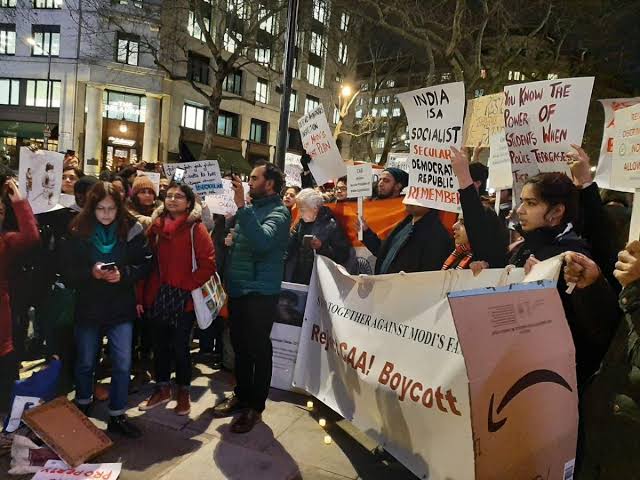London/Washington: Hundreds of students and representatives from diaspora and workers’ groups gathered outside the Indian High Commission in London Wednesday to protest against the Citizenship Amendment Act (CAA) and the National Register of Citizens (NRC).
The protest, organised by the India Society of the School of Oriental and African Studies (SOAS) and supported by other universities including London School of Economics (LSE), involved sloganeering such as “Inqalab Zindabad” and placard waving against the Indian government’s move to impose the CAA, which has sparked protests across India.
According to the Citizenship Amendment Act (CAA), members of Hindu, Sikh, Buddhist, Jain, Parsi and Christian communities who have come from Pakistan, Bangladesh and Afghanistan till December 31, 2014 following religious persecution there will get Indian citizenship.
“This hurriedly approved bill has at a stroke removed rights especially from Muslim migrants. It undermines the basis of India’s secular democratic constitution,” said Harsev Bains, National Vice President of Indian Workers’ Association Great Britain (IWA-GB), an 80-year-old diaspora group.
“We as patriotic Indians feel let down and angered that our great country, that led the way in diversity and tolerance, should act in such a manner. Refugees from all over the world have always been welcomed and accommodated in India. Never before has India introduced exceptions and exclusions based on faith,” he said.
The protest Wednesday coincided with “March for the Constitution” events being organised across Indian cities this week, as well as outside the Indian Consulate in New York.
It follows protests at universities across India since the Citizenship Amendment Bill was passed in the Lok Sabha last week. The India Society of the University of Oxford was among the groups to organise protests earlier in the week.
A statement released by the Oxford India Society said: “Oxford India Society (OIS) stands in solidarity with our fellow students at university campuses across India who are protesting against the unjust Citizenship Amendment Act, and we condemn police brutality against these protestors.
“OIS celebrates India’s unity in diversity; we are saddened that this spirit of unity is under threat, and we hope that the right to peaceful protest is upheld.”
Their protest Tuesday attracted hundreds outside the famous Radcliffe Camera at the heart of Oxford University, waving placards that read: “Selective democracy is not democracy” and “Unconditional solidarity with Jamia, AMU, DU [Delhi University] and others”.
UK as well as many US universities have expressed solidarity with Indian universities in the worldwide protests against CAA.
Meanwhile, the Indian High Commission in London circulated a ‘Frequently Asked Questions (FAQs) on Citizenship (Amendment) Act 2019’ document, addressing aspects of the new act.
“There has been a mis-information campaign. The CAA does not affect any Indian citizen, including Muslim citizens,” notes the government clarification.
“It has absolutely nothing to do with any Indian citizen in any way. The Indian citizens enjoy Fundamental Rights conferred on them by the Constitution of India. No statute including the CAA can, abridge or take them away,” it says.
Meanwhile, in Washington, the United States honours Indian democracy as they have a robust debate inside the country on the issues like citizenship and religious freedom, a top American diplomat said Wednesday.
“We care deeply and always will about protecting minorities and religious rights everywhere. We honour Indian democracy as they have a robust debate on the issue that you raised,” Pompeo told reporters at a news conference here at the conclusion of the 2+2 ministerial talks.
Pompeo along with the Defense Secretary Mark Esper Wednesday hosted their Indian counterparts External Affairs Minister S Jaishankar and Defense Minister Rajnath Singh for the talks.
The top American diplomat was responding to a question on the protests by a section of society in India after the passage of the Citizenship Amendment Act, alleging that this is religiously discriminatory in nature.
“Mr Secretary, your State Department has been a very vocal advocate of religious rights around the world. Do you think it appropriate for democracy to use faith as a determining criteria for citizenship,” he was asked.
“The question that you asked relating to India, if you had followed the debate on that particular legislation carefully, you would see that it is a measure which is designed to address the needs of persecuted religious minorities from certain countries,” Jaishankar said in his response to the question.
“If you look at what those countries are and therefore what their minorities are, perhaps you understand why certain religions were identified in terms of characterising those who had come across,” Jaishankar said.
Pompeo said the United States has been consistent in the way that it has responded to these issues, not only in India but all across the world.
Officials, so far, have not confirmed or denied if the issue of religious freedom and human rights in India appeared during the 2+2 talks.
In the past, the Secretary of States had raised the issue of human rights and religious freedom with their Indian counterparts in their bilateral meetings.
PTI
